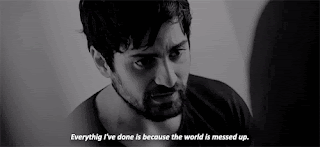You are being watched...
Technology is a prioritized importance during the process. Specifically, surveillance technology is essential for the leaders to watch the contestants during the tasks they are completing. This allows the leaders to analyze the contestant’s responses and actions to the situations they are placed in. In episode Chapter 03: Corridor, the leaders gave the contestants the task of crossing a dark tunnel within a total of five minutes. However, this was not just an ordinary tunnel, the leaders released an odorless gas into the tunnel. This gas is described to have a “profound effect on the brain’s occipital lobe” (Charlone Tiago Mello) which causes hallucinations. Without the surveillance technology, the leaders would not be able to actively survey and analyze the contestants without breathing in the gas themselves which would cause them to hallucinate as well. Therefore, the data they note on each contestant would be inaccurate or compromised if they were under that type of condition. This is why the surveillance cameras are essential to this task as well as many others so that the contestants can be properly analyzed by the leaders.
The surveillance technology is widely accepted by the cultural narrative of this specific society. The contestants know they are being watched and accept it. In this society, the technological diffusion phase of this specific surveillance technology would be categorized as familiarization and innovation because of how accepted it is within their society. Although, in the modern-day society of our real world, many people would be hesitant towards the idea of being watched on cameras everywhere they go. Although we do not have a so-called “process” as they do in the 3%, I am confident in saying that many would consider it an invasion of privacy. Specifically, in Brazil where the television show is filmed, there are laws that perpetrate surveillance technology within that country with certain limitations. Specifically, the Brazilian law No. 9.296/96 called the Interception of communications and police infiltrations allows the interception of telephone and information technology systems regarding criminal procedures or investigations. The only way to access this information is through a government-issued court order for a strong suspicion or evidence that a citizen has committed a crime. Therefore, the citizens are only subject to surveillance technology of the government if they break a specific law and a court order is obtained.
Although government interference with surveillance technology exists in both realms, the fictional world of 3% and the reality of Brazil, they are two entirely different types. In the 3%, they are physically watching every move a contestant makes throughout the process. Whereas in Brazil, they are surveying certain technology such as cellphones, social media, and other aspects. They are not physically videotaping their bodies as they are in the 3%, at least not with public knowledge. Whereas in the 3%, everyone openly accepts the fact that every move they make will be videotaped for the leaders to analyze. They are two completely different areas of technology and surveillance. The Brazilian citizens would probably not be as accepting as the 3% contestants are of having every move they make being analyzed and videotaped by the government.
Sources:
Charlone Tiago Mello, César. “3%, Chapter 03: Corridor.” Season 1, episode 3, 2016.
https://privacyinternational.org/state-privacy/42/state-privacy-brazil#:~:text=Surveillance%20laws&text=Interception%20of%20communications%20in%20Brazil%20is%20regulated%20by%20Law%209.296%2F96.&text=The%20request%20must%20be%20founded,obtain%20evidence%20of%20such%20crime.


Comments
Post a Comment